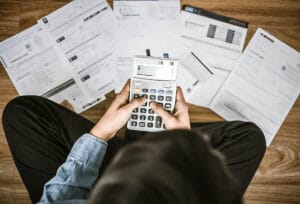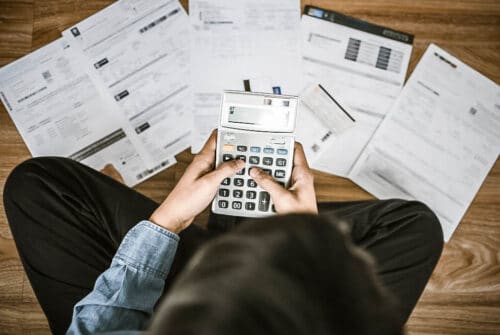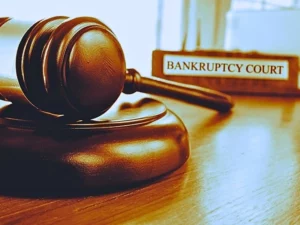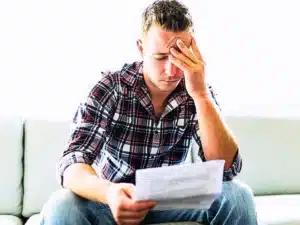
Filing Bankruptcy After Divorce
The decisions made in the bankruptcy court can override the orders in the divorce decree that determined the responsible party to pay a debt. Filing bankruptcy after divorce can impact multiple parts of a settlement decree, including both property debts and the amount of spousal payments.

An estimated 747,000 couples get divorced each year in the United States, hoping to each go their own way after the process has been finished. When they do, couples may think that the property and the debt that has been divided in the decree is the end of the process, but that is not always the case when one spouse files for bankruptcy after the divorce. This could leave the ex-spouse who did not file for bankruptcy responsible for debts that were not assigned to him or her during the divorce process, and he or she may not be in a position to pay them in a timely fashion. After the divorce decree has been issued, both spouses should pay close attention to how it is worded to understand how bankruptcy can affect the decree, even years later.
Filing Bankruptcy After Divorce in Nevada
After a divorce is finalized, most couples are able to move forward creating their independent lives without having to continue to communicate with each other. Some divorce decrees, however, include orders to check in with each other before proceeding with certain legal actions, but that is only in some instances. If one ex-spouse decides on filing bankruptcy after divorce and the other does not, a spouse may find himself or herself responsible for any loans, credit cards, and accounts he or she has co-signed on during the marriage. If the responsibility for a debt has been discharged for one person, the creditors can only proceed on the second party named, despite what was outlined in court.
Another major concern regards property that had both spouses’ names attached to it. Though the responsibility of the property may be designated to one spouse, the divorced status can affect how that property is handled within the bankruptcy proceedings. This type of property is much more likely to be liquidated to pay off other debts. Which chapter of bankruptcy the ex-spouse files can determine if this is the case, as both chapters handle how debt is taken care of differently and in different time frames.
Child support and spousal support payments can not be discharged through bankruptcy, and in fact, child support must stay current during the whole process. Though a filer can file on his or her own, a bankruptcy lawyer can help to navigate this process if he or she has any remaining questions.
Hold Harmless Provisions
Life after bankruptcy can be complicated for the spouse who did not file, especially if he or she is left owing debts he or she believed were dismissed after the divorce was finalized. Hold harmless provisions are added into the divorce decrees, and this is a language that obligates only one of the spouses for the responsibility of that debt. Once the debts and other property have been divided, that is usually the end of it. However, the bankruptcy courts do not always agree that this determines this debt to be non-dischargeable during the bankruptcy.
Hold harmless provisions can be difficult to defend in court, and the defense could be a lengthy process if the ex-spouse does decide to do so. Therefore, you may want to think about this when considering, “Should I file bankruptcy before or after divorce?” Because hold harmless provisions are the standard language used in a divorce decree, both parties might understand which debts are theirs after a divorce but may not understand how bankruptcy can override this language. This can mean that an ex-spouse may begin having creditors calling them for old debts he or she did not think were owed. Besides co-signed debts and accounts, an ex-spouse could also be left dealing with a tax debt after a divorce, if the spouse named responsible in the decree does not make his or her payments on time.
Hold harmless provisions are put into divorce decrees to help both spouses navigate a difficult time, however they cannot be solely relied on to protect the spouse long term. While a divorce is taking place, one or more parties might become emotional and unable to focus on all the verbiage in every document involved with the process. When the divorce is finalized and both spouses have had time to calm down, they should read over the decree and any other agreements to make sure they understand what each one means. They should also make sure they keep copies of all relevant documents, so they can provide them to creditors if the need arises when filing bankruptcy after divorce.
Steps to Protect Yourself with Bankruptcy and Divorce
It would be easier for both parties if they were able to file for bankruptcy before they file for divorce, as this could eliminate the debt for both individuals. However, this may not always be possible due to the length of time it could take depending on the chapter they would have to file to complete the bankruptcy process. If this can not be handled before the divorce process has begun, then before it has been finalized, both spouses should take steps to protect themselves. These steps could include:
- Refinancing both cars and homes to be in one person’s name. If not done prior to filing, spouses should then try to have language written into the decree that states a time frame for the refinancing to be accomplished.
- Selling jointly owned property. Selling joint property is a good way to get rid of the responsibility of payments on the property, and might help with the expensive divorce process.
- Paying off any credit cards that have both spousal names listed. Once joint debt is paid off, spouses can get new cards that are independent once the divorce has been finalized.
- Understanding the difference between a spousal maintenance payment and an equalization payment. These payments help make up for any inequality in property division. While the equalization payment can be discharged through bankruptcy, spousal maintenance payments cannot.
- Reaching out to any known creditors about joint debts after the decree is issued. Notifying creditors of the change of responsibility, and providing a copy if necessary, can help protect a spouse from future responsibility for the debt in question.
Although many of these steps are more useful prior to filing for divorce, it is still possible to use these steps to protect the ex-spouse that does not file for bankruptcy even after the divorce has been finalized. What happens if you divorce during a chapter 13 bankruptcy as both parties are unable to stay together, is that the divorce proceedings can be delayed due to the bankruptcy process.
Chapter 13 bankruptcies take years to complete as they have a strict repayment schedule, as well as other guidelines to maintain. If the ex-spouse waits to file for their chapter 13 after the divorce has been finalized, then that lengthy process helps the other spouse as well. No creditors are allowed to try to collect the debt while the bankruptcy stay is in place. This can give the ex-spouse who did not file for bankruptcy time to figure out how to pay for any remaining balance.
This is not the case when filing bankruptcy after divorce as a chapter 7. It does not put an automatic stay into place, and takes months to complete instead of years. Chapter 7 bankruptcy gives far less time for the ex-spouse, left responsible, time to pay voluntarily without the creditors able to collect through legal channels. If an ex-spouse is prepared for either time frame, then the repayment process will be easier to complete if the need does arise. Keeping these and other such factors in mind when considering, “Should I file bankruptcy before or after divorce?” may aid you in making the choice best suited for your circumstances, needs, and goals.
Learn More About Filing Bankruptcy After Divorce
How Much Does a Bankruptcy Lawyer Cost?
What Happens When You Declare Bankruptcy?
How to Refinance Your Home During a Chapter 13 Bankruptcy





